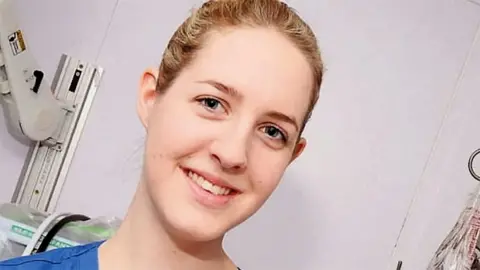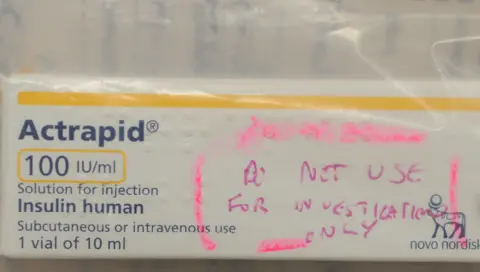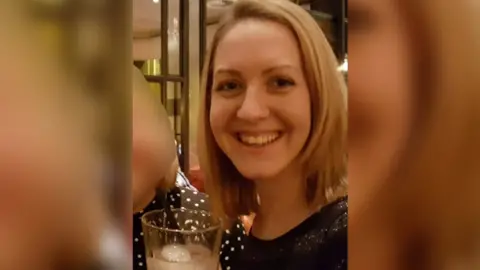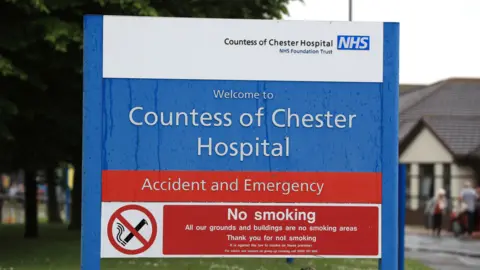Lucy Letby: Baby was at risk of coma and death, nurse trial hears
 SWNS
SWNSA baby allegedly poisoned with insulin by Lucy Letby was left at risk of coma and death, an expert has told the nurse's murder trial.
Ms Letby is accused of attempting to kill the boy, referred to as Child F, at Countess of Chester Hospital, in August 2015.
She has denied murdering seven babies and attempting to murder 10 others.
Prof Peter Hindmarsh said the child's blood sugar fell worryingly low for a persistent length of time.
Ms Letby, 32, is alleged to have intentionally added insulin to the infant's intravenous feed bag on a night shift, less than 24 hours after she allegedly murdered his twin brother, Child E, on the hospital's neonatal unit.
The twins had been born prematurely and Ms Letby, originally of Hereford, cared for both boys, the jury has heard.
'Significant change'
No babies on the unit were being prescribed insulin at the time and three of Ms Letby's former colleagues have said they did not give the medicine to the child, Manchester Crown Court has heard.
Jurors have heard how Child F's heart rate surged to over 200bpm and his blood sugars dropped after the feed was started shortly after midnight on 4 August.
Prof Hindmarsh, an expert in paediatric diabetes, outlined the effects of prolonged low blood sugar in the body - a state of shock known as hypoglycaemia.
 Crown Prosecution Service
Crown Prosecution ServiceA reading of 2.3 would be expected to lead to "confusion" and difficulties with tasks such as reading and writing, he said.
Lower readings could lead to seizures, death of brain cells, coma, and in some cases, death, the professor told the jury.
A chart shown to the court showed blood sugar readings for Child F over a period of 17 hours throughout 5 August, with readings dropping initially to 0.8, before fluctuating at low levels.
The reading of 0.8 was "extremely low" and a "very significant change", the professor said.
It was "absolutely" a cause for concern, he told the court.
Referring to the chart, he said hypoglycaemia was "persistent" right through the day.
The readings remained low despite Child F receiving glucose and dextrose that would amount to "twice the normal requirements of a baby", he said.
Discussing how insulin could be given, Prof Hindmarsh said the medicine could not be taken orally as it would be broken down by stomach acids.

Skin injection would not fit with the 17 hours of hypoglycaemia, he said, as that would require repeated injections.
He said infusion would be "probably the most likely way of achieving the blood glucose effect that we have observed".
Prof Hindmarsh said this would "fit nicely with the time course of events" and was consistent with the measurements made after the feed bag was stopped.
A bottle of insulin was shown to the court and the professor explained how a health worker would need to use a syringe to carefully extract the liquid.
The court earlier heard from Anna Milan, a clinical biochemist at Liverpool Royal Hospital, who explained how blood tests were analysed.
She said tests for Child F showed high levels of insulin alongside low levels of a hormone called C-peptide, which confirmed he had been given insulin as a medicine, rather than it being naturally produced by the body.
She said blood samples arrived frozen, within a short time window, and various "quality control" procedures were carried out throughout the testing process.
 PA Media
PA MediaChild F recovered in the following days following his alleged poisoning but his twin brother, who was born a minute earlier, died after air was allegedly injected into his bloodstream by Ms Letby.
The court has heard Ms Letby messaged a colleague to say something was "not right" about the child.
She also arranged to go salsa dancing the following evening.
The trial continues.

Why not follow BBC North West on Facebook, Twitter and Instagram? You can also send story ideas to [email protected]
